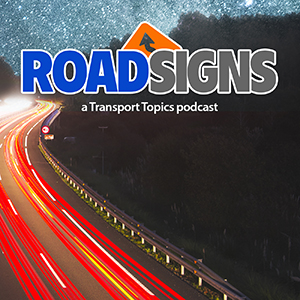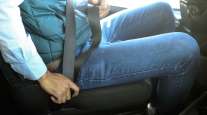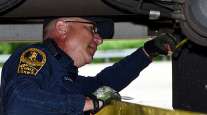Senior Reporter
CVSA’s Collin Mooney: Trouble Awaits Fleets Delaying Switch From AOBRDs to ELDs

ALEXANDRIA, Va. — A “manufacturers crisis” in transferring automatic onboard recording device software into electronic logging devices is in the making, according to the head of the trade organization representing commercial vehicle inspectors.
“Manufacturers can only transition so many motor carriers from AOBRDs to ELDs at one time,” Commercial Vehicle Safety Alliance Executive Director Collin Mooney, a panelist at a March 22 session of American Trucking Associations’ Safety Management Council, told truckers here. “If all of you are requesting transitioning in the third week of November after Thanksgiving, you’re not going to be able to transition over fast enough.”

Mooney
As a result, many carriers may not make the change in time for the Dec. 17 regulatory deadline, which would be an out-of-service violation for 10 hours at a roadside inspection, Mooney said. He believes there will not be an extension of the ELD final implementation date unless there is a regulatory change or legislative push by Congress.
“So work with your vendor and make sure that you have the time period in order to transition properly,” Mooney added.
Mooney said that other ELD and hours-of service challenges for inspectors include:
• A need for the Federal Motor Carrier Safety Administration to better define what shipments are classified as agricultural commodities. “When you’re hauling apples one day and apple juice the next day, one is processed and ceases to be an ag commodity,” Mooney said. “Not defining this is going to have a significant impact on how we detect hours-of-service roadside.”

Panelists Gonnerman (from left), Mooney, Cuthbertson and Fakkema. (Eric Miller/Transport Topics)
• Exemptions from hours-of-service and ELD requirements have become a major problem for inspectors. “It’s really disconcerting because the ELD mandate itself was intended to move us from a paper environment to an electronic environment,” he said. “However, what we’ve created is an hours-of-service crisis.”
• Too many drivers stopped at roadside for inspections do not know whether they are using AOBRDs or ELDs. “Because the AOBRD is in an electronic format, drivers feel that that’s an electronic logging device. It’s not,” Mooney said. “So please do yourselves a favor, make sure your drivers are aware what they’re using.”
• A need for FMCSA to precisely define the time and distance that drivers can go for personal conveyance time. “We believe that personal conveyance needs to exist,” he said. “However, our position as an association is that we need to put some parameters around it whenever there’s distance or time involved. We encountered a number of personal conveyance operations where it’s four to eight hours, like people driving from Alabama to Texas.”
Other panelists at the session urged motor carriers to train their drivers well on the ELD systems in the trucks they’re driving. Of particular concern were the way ELDs are annotated for personal conveyance, yard moves, malfunctions, undefined truck movements and logging in and out of their ELDs. Panelists also said carriers should keep an eye on FMCSA’s frequently asked questions about ELDs, which can change weekly, offering updated guidance.

In our season 2 debut episode of RoadSigns, we ask: What will trucking's business leaders need to make the transition from AOBRDs to ELDs in time? Hear a snippet from Fred Fakkema, vice president of compliance at Zonar, above, and get the full program by going to RoadSigns.TTNews.com.
The 90-minute wide-ranging ELD discussion was moderated by Lisa Gonnerman, vice president of safety and security for Transport America, based in Eagan, Minn.
“I don’t think enforcement is out to rail anybody,” said panelist Thomas Cuthbertson, vice president, regulatory and compliance for Omnitracs. “It’s all about intent. Annotations put in correctly are going to save a lot of grief.”
ABOUT AOBRDS: Omnitracs Executive Urges Carriers to Migrate to ELDs From Older E-Logs
“You have to have a plan,” said Fred Fakkema, vice president of compliance for Zonar Systems. “If you’re not speaking to your vendor, it’s going to be very painful.”
“What I’ve observed is what we’re working through now is a lot of fraud and abuse that existed in the system,” Mooney said in an interview after the session. “The wiggle room that drivers had in their paper logs, which technically is illegal, has now been redefined, and pushed a lot of that fraud and abuse into personal conveyance.”




